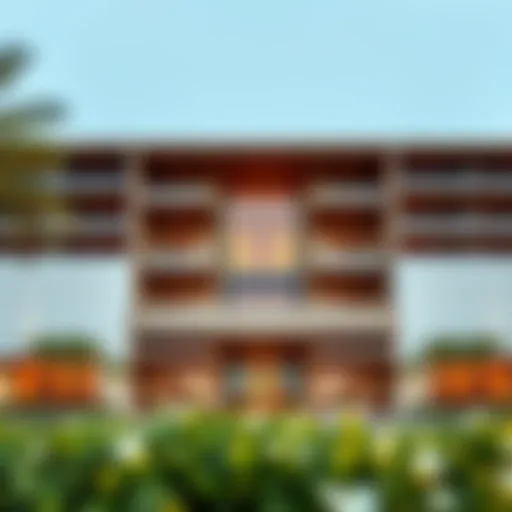Exploring Real Estate Companies in the UAE Market


Intro
Navigating through the bustling real estate scene in the UAE, especially in Dubai, can often feel like walking a tightrope. The market is ever-evolving, driven by a mix of cultural influences, economic shifts, and urban development projects. Investors, homebuyers, agents, and analysts alike must stay sharp to understand the intricacies that influence property values and demand. In this comprehensive examination, we will delve into several key topics that define the real estate landscape.
From deciphering current trends to forecasting future movements, we'll explore various property types and their respective potential advantages and challenges. It is essential for our audience to grasp not just the numbers, but the underlying factors that contribute to market dynamics. This guide will serve as a resource to make informed decisions, whether you're looking to buy, sell, or invest. Let’s dive into the nitty-gritty of what’s happening in the UAE’s real estate market.
Market Trends
Current Real Estate Trends in Dubai
Dubai’s property market is currently buzzing with activity. A closer examination reveals several notable trends.
- Increased Demand for Luxury Properties: Wealthy buyers, both domestic and international, are drawn to high-end apartments and villas. Developments in areas like Palm Jumeirah and Downtown Dubai demonstrate this appetite for upscale living.
- Sustainability as a Selling Point: Newer developments emphasize eco-friendliness, with many incorporating features aimed at reducing energy consumption and promoting greener living.
- Shift Towards Off-Plan Sales: Developers are seeing a rise in interest in off-plan properties, thanks to flexible payment plans and the allure of buying at lower prices before completion.
Real estate agencies are adapting to these trends, using tech-driven strategies for marketing and management, which foretells a shift in how property transactions will unfold in the future.
Future Forecasts for the Dubai Property Market
Looking ahead, several predictions have emerged regarding Dubai's real estate sector.
- Stabilization Following Flourishing Growth: Analysts forecast a period of stabilization following the previous rapid growth, leading to steady prices rather than the highs of past years.
- Economic Influences: The upcoming Expo and further infrastructure projects are expected to boost Airbnb and rental demand, influencing both commercial and residential property prices.
- Increased Foreign Investment: As countries gradually recover from economic uncertainties, Dubai’s proactive approach in attracting foreign investment is likely to yield visible results.
"Real estate trends often mirror the broader economic state. A healthier economy will invariably lead to a more vibrant property market."
Property Types
Residential Properties: Overview and Insights
The residential segment of Dubai's market offers diverse options, from studio apartments to lavish villas. Different types boast unique characteristics that cater to various buyer needs:
- Apartments: Popular among young professionals, apartments in areas like JLT or Dubai Marina offer a vibrant lifestyle with great amenities.
- Villas: Families often lean towards villas, especially those located in quiet communities such as Arabian Ranches or Jumeirah Village Circle. These homes provide space and privacy while being part of a community.
Stakeholders should keep an eye on zoning laws and community guidelines in their property search to ensure compliance and suitability for their needs.
Commercial Properties: Opportunities and Challenges
The commercial real estate market is both robust and complex. Opportunities abound, but so do challenges:
- Office Spaces: With more companies embracing remote work, the demand for traditional office spaces has shifted. Flexible workspaces and co-working facilities have surged in popularity.
- Retail Opportunities: As the economy recovers, retail spaces in high-traffic areas are experiencing revitalization. However, competition from online retailers presents an ongoing challenge.
Understanding the pulse of commercial real estate can offer lucrative opportunities if tackled with foresight and strategy.
Preamble to the UAE Real Estate Market
Real estate in the UAE is not just a sector; it’s a vital cornerstone of the nation’s progress and prosperity. As one of the fastest-growing markets in the world, the UAE presents a unique blend of opportunities, challenges, and cultural intricacies that are essential to understand for stakeholders at any level. This article lays the groundwork for exploring the complex landscape of real estate companies operating within the UAE, specifically focusing on their strategies, innovations, and overall impact on the economy.
When delving into the intricacies of the UAE real estate market, it is crucial to consider various elements. The local economy is heavily bolstered by oil revenue, yet the government has recognized the need for diversification, making real estate a central pillar of this strategy. Major cities like Dubai and Abu Dhabi have become hotspots for investors, developers, and homebuyers alike. Understanding the dynamics at play here means acknowledging not only current trends but also historical contexts.
Overview of the UAE's Economic Landscape
The UAE boasts a robust economy that has seen rapid growth over the last few decades. Traditionally reliant on oil, the country has diversified effectively into tourism, finance, and, crucially, real estate. This diversification has fortified the economy, allowing it to weather global downturns better than many of its peers.
Key characteristics of the UAE’s economic landscape include:
- High GDP Growth Rate: The IMF often reports optimistic forecasts for the UAE's GDP growth, driven by strong trade links and infrastructural investments.
- Foreign Investment: The UAE has established free zones that attract businesses and investors from around the globe, providing tax incentives and minimal restrictions.
- Strategic Location: Positioned at the crossroads of Europe, Asia, and Africa, the UAE is a vital trade hub, enhancing its attractiveness for real estate ventures.
- Tourism Hub: With millions visiting each year, the strong tourism sector elevates demand for both commercial and residential real estate.


These economic facets not only paint a broad picture of the region’s financial health but also underscore its potential for real estate investments.
Historical Context of Real Estate Development
Understanding how the real estate market in the UAE evolved is essential to grasping its current state. The UAE's modern narrative began in the late 20th century, transitioning from a reliance on pearl diving and fishing to a thriving market powered by oil.
- 1970s to 1980s: Initial developments were modest. The creation of structures like the Burj Al Arab heralded changes, signaling the start of ambitious projects that would define the skyline.
- 1990s: As the economy opened up, private sector involvement became more prominent. This period saw urbanization, with a focus on master-planned communities.
- 2000s: The real estate sector boomed. Developments such as Palm Jumeirah transformed the coastlines, while property laws began reflecting a more open market, allowing foreign ownership.
- Post-2008: The market faced challenges with the financial crisis. However, recovery was swift, leading to the current era characterized by innovation and a focus on sustainability.
Today, as companies navigate a rapidly changing landscape, understanding this historical context is critical for forecasting future opportunities and challenges.
Investors, homeowners, real estate agents, and analysts are thus encouraged to consider both the economic underpinnings and the historical trajectory as they engage with the UAE's ever-evolving real estate sector.
Leading Real Estate Companies in the UAE
In the vibrant tapestry of the UAE's economy, particularly in its real estate sector, the leading companies play a crucial role in sculpting the landscape. They’re not merely businesses; they’re pivotal players that shape understanding of market dynamics, make waves with innovations, and set benchmarks for future endeavors. Grasping the significance of these companies provides investors and homebuyers alike with valuable insights into potential opportunities and risks.
A Closer Look at Prominent Players
As we venture deeper into the heart of the UAE’s real estate market, we encounter several companies whose footprints are etched in the sands of time. These firms are not only large in size but also impactful in their approach. Each company brings its unique flair to the industry, reflecting the broader trends and future directions of real estate in this region.
Company A: Market Position and Influence
Company A holds a commanding position in the UAE's real estate environment. This firm's market share reaches impressive heights, thanks to its strategic developments and high-profile projects. One key characteristic that sets Company A apart is its impressive portfolio that showcases luxury and innovation.
The unique feature here is the firm’s focus on sustainability, which resonates with current global trends and buyer preferences. This aspect not only boosts their reputation but also draws in environmentally conscious investors. While the company’s stature suggests stability, it is also subject to the potential pitfalls of market fluctuations and regulatory scrutiny, making it a double-edged sword.
Company B: Innovative Strategies
Company B differentiates itself through its innovative strategies that continually reshape the market. By embracing cutting-edge technology and implementing smart solutions in building designs, they have carved out a niche for attracting a tech-savvy clientele. For instance, their commitment to integrating smart home features sets them apart as a forward-thinking entity.
This proactive approach to innovation is quite beneficial for the company in attracting modern investors. However, it also presents challenges, specifically in keeping pace with rapid advancements without compromising cost-efficiency and functionality in projects.
Company C: Financial Performance
Company C stands out not just for its visibility but also for its formidable financial performance. This company is often seen topping the charts regarding revenue growth and market capitalization within the UAE real estate sector. Its key characteristic is financial resilience—being able to weather economic storms better than many competitors.
The firm's focus on diversifying its investment portfolio, which includes both residential and commercial properties, plays a crucial role in its stability. However, this broad approach can sometimes dilute focus and operational efficiency, posing long-term strategic questions.
Emerging Companies to Watch
As the real estate scene continues to evolve, several new names are starting to gain traction. Emerging companies, often characterized by their agility and willingness to embrace change, are challenging traditional players by offering fresh perspectives and innovative solutions.
These firms tend to prioritize more affordable housing options and are typically more aligned with the evolving needs of buyers, particularly younger demographics. As they gain footholds in local markets, it’s essential for both investors and stakeholders to monitor their progress carefully, as they may very well shape the future of real estate in the UAE.
Market Trends and Insights
Understanding market trends and insights is crucial for anyone looking to make informed decisions in the UAE real estate landscape. These trends reflect the ongoing shifts in buyer behavior, industry standards, and economic influences that shape the market. Recognizing these evolutions can help investors, homeowners, and industry professionals navigate the complexities inherent in real estate.
Current Trends Shaping the Market
Sustainable Development Practices
Sustainable development practices have gained significant traction in recent years in the UAE's real estate scene. With a growing emphasis on environmental responsibility, many companies are integrating sustainability into their projects. This shift is not merely a trend; it’s becoming a necessity, given the global push towards conserving natural resources. One key characteristic of these practices is the use of eco-friendly materials and energy-efficient designs. Companies like Emaar Properties are leading by example, adopting green building standards that not only enhance the aesthetic appeal of projects, but also reduce long-term operational costs for homeowners.
The unique feature of this approach lies in the dual benefit of being environmentally conscious while catering to modern buyer preferences. However, the initial investment can be a barrier for some developers. Despite this, the long-term advantages such as lower utility bills and increased property value make sustainability a popular choice among savvy investors.
Impact of Technology on Real Estate


Technology’s role in transforming the real estate market cannot be overlooked. From virtual reality tours to advanced data analytics, technology enables real estate companies to engage with a broader audience and streamline operations. The ability to offer virtual property tours has made it easier for potential buyers to explore listings without geographical constraints. This is particularly appealing in a market where international buyers often seek property in the UAE.
A significant characteristic of technology in real estate is its capacity to enhance customer experience through personalized services. Automated tools allow realtors to analyze buyer preferences and tailor offerings accordingly. However, relying too heavily on technology can lead to a perceived lack of personal touch, which might not sit well with all buyers. Balancing automation with human interaction remains a critical consideration.
Changing Buyer Preferences
The preferences of buyers in the UAE real estate market are continuously evolving, influenced by demographic shifts and lifestyle changes. Young professionals and families are showing a growing interest in properties that offer lifestyle amenities such as gyms, pools, and community spaces. This trend indicates a move towards holistic living, where convenience and community are prioritized over mere square footage.
This shift towards experiential living reflects the key characteristic of the current market: buyers are looking for homes that provide not just shelter, but quality of life. Such preferences present both challenges and opportunities for developers. The unique aspect of this trend lies in the necessity for developers to adapt to an increasingly discerning clientele. Failure to do so could result in properties sitting on the market longer than expected, affecting overall sector health.
Economic Factors Influencing Growth
The UAE real estate sector is also shaped by several economic factors. Fluctuations in oil prices, foreign investment levels, and government policies all play a critical role in determining market conditions. The UAE's strategic position as a business hub continues to attract international investors, which bolsters market demand. However, economic volatility presents challenges, particularly during downturns when property values can experience significant fluctuations.
The interplay of these economic elements influences growth trajectories in various ways. For instance, government initiatives aimed at stimulating the economy through infrastructure projects can lead to increased demand for property in newly developed areas.
For more information on current real estate trends, check out sources like Wikipedia or local news outlets.
Investment Opportunities in UAE Real Estate
Investment in real estate within the UAE is not just a trend; it's become a cornerstone for wealth accumulation and economic stability. With a rapidly growing economy and a desire for luxury and innovation, the UAE, especially Dubai, serves as a lucrative ground for investment. Analyzing investment opportunities in this domain reveals various aspects, benefits, and strategies that can provide considerable returns for investors, homebuyers, agents, analysts, and developers alike.
Residential vs. Commercial Investments
When it comes to choosing between residential and commercial real estate investments in the UAE, each option presents its own set of advantages and challenges. Residential properties often guarantee a steady stream of rental income, as the demand for housing remains high due to immigration and a growing population. They also tend to have lower entry costs than commercial properties, making them accessible to a broader range of investors.
On the other hand, commercial real estate investments can be more lucrative in the long run. Monies from businesses tend to have longer lease terms compared to residential units, which can translate into more stable income for investors. Yet the initial investment might be steep, and the management requires a more specialized knowledge of market dynamics and tenant needs.
Both types have their merits; thus, an investor must weigh factors like risk tolerance, financial goals, market analysis, and location choice in making their decision.
Key Areas of Growth and Development
Dubai Marina
Dubai Marina stands out as a prime location in the UAE real estate landscape, revered for its extravagant waterfront. This area offers a vibrant lifestyle that attracts both local and international buyers. The key characteristic of Dubai Marina is its high-rise residential towers and luxury apartments overlooking the marina. Investing here is considered beneficial due to the demand generated by expatriates and tourists who flock to live in or experience this upscale location.
One unique feature of Dubai Marina is the pedestrian-friendly boardwalk, which enhances its allure for residents and tourists, promoting outdoor activities like dining and shopping. However, the cost of entry can be steep, making it less accessible for first-time buyers who might feel the pinch in their pockets.
Downtown Dubai
Downtown Dubai is another jewel in the realm of UAE real estate investment. This area is recognized for its iconic landmarks, including the Burj Khalifa and Dubai Mall, making it highly desirable. Its key characteristic is its combination of residential units and commercial properties, catering to a wide array of investors, thanks to the high foot traffic and tourism. This area boasts a solid return on investment, particularly through short-term rentals.
A unique feature of Downtown Dubai is the integration of luxury living with conveniences like accessibility to world-class amenities. Although this area does come at a premium in terms of price, the long-term value and potential for appreciation often outweigh the disadvantages for savvy investors.
Emerging Suburbs
Focusing on the emerging suburbs is becoming a trend as investors seek more affordable options without compromising on quality and lifestyle. These suburbs are characterized by their affordable housing options and growing infrastructure. Investing in these areas can be advantageous as they often have the potential for price appreciation as demand increases over time.
A unique aspect of emerging suburbs is the availability of land for development, which offers developers attractive opportunities to create new infrastructures or communities. However, the downside might involve longer waiting periods for appreciation and possibly less established community amenities compared to urban-centric locations.
Investing in UAE real estate is about finding the right balance between immediate returns and long-term growth potential across diverse segments of the market.
In summary, the UAE real estate market, particularly in areas like Dubai Marina, Downtown Dubai, and the emerging suburbs, reflects a rich tapestry of opportunities for a variety of stakeholders. Each segment within the market has diverse benefits, and understanding these can empower investors to make informed decisions that align with their goals.
Challenges Facing the Real Estate Sector
The real estate sector in the UAE has been booming over the years, yet it comes with its fair share of challenges. Understanding these hurdles is crucial for investors, homebuyers, agents, analysts, and developers alike. Navigating through these complexities is not only essential for maintaining a healthy market but also for informing strategic decisions that affect ROI and overall market stability.


Regulatory Challenges
One of the standout issues facing real estate companies in the UAE is the regulatory framework that governs property ownership, development, and transactions. The UAE has established a range of policies aimed at stimulating investment and promoting transparency, but compliance with these regulations can often feel like walking a tightrope.
From visa requirements for foreign investors to the nuances of property laws in different emirates, every step comes with its unique set of rules that can trip up even the most seasoned investors. For instance, in Dubai, property transactions require a NOC (No Objection Certificate) from developers, while Abu Dhabi has its own distinct regulations regarding ownership.
"Understanding regulatory frameworks can empower investors to navigate the complex landscape more effectively."
This legal labyrinth not only poses challenges but also presents opportunities for companies that can adeptly maneuver these regulations. Strategies such as engaging local legal experts can prove beneficial. Furthermore, staying updated with regulatory changes is vital to avoid pitfalls. Failure to comply could result in hefty fines or even legal disputes, which can adversely affect a company’s reputation and financial standing.
Market Volatility and Economic Factors
Another significant challenge plaguing the UAE's real estate sector is market volatility, largely driven by global economic shifts and local market trends. For instance, fluctuations in oil prices can heavily impact investor sentiment and property values, particularly in regions that heavily rely on oil revenues. This can create a ripple effect, influencing everything from financing conditions to consumer confidence.
Additionally, factors such as geopolitical concerns and changes in foreign investment patterns can exacerbate market unpredictability. In recent years, shifts in foreign policy and international relations have led to uncertainty, which can cause potential buyers to hold off on investments, waiting for stability before committing.
Moreover, it’s essential to consider how technological advancements are affecting market dynamics. Companies must not only adapt to evolving technologies but also anticipate the potential disruptions they may bring to traditional real estate practices. For instance, the increasing adoption of virtual reality for property viewing can shift buyer preferences, making it crucial for companies to innovate continuously.
Future Prospects for Real Estate Companies
The future of real estate companies in the UAE is a topic of significant importance, particularly for those looking to make informed decisions in a fast-evolving market. Understanding the upcoming trends and predictions can guide investors, homebuyers, agents, analysts, and developers in identifying opportunities and risks. This section scrutinizes various elements influencing potential growth, strategies for sustainability, and how innovation plays a crucial role in shaping the industry landscape.
Predictions for Market Growth
There's a palpable optimism regarding the future of the UAE real estate market. Analysts predict that the sector will continue its upward trajectory due to several factors:
- Foreign Investment: As global travel restrictions ease, many foreign investors are looking toward the UAE as a stable investment haven. Its tax-free environment and strategic location make it an attractive proposition.
- Expo 2020 Legacy: The aftermath of the World Expo 2020 is expected to give a significant boost to tourism and hospitality sectors, which, in turn, will drive demand for residential and commercial properties. Real estate firms are keen on capitalizing on this momentum.
- Population Growth: The UAE continues to attract expatriates lured by its robust job market, climate, and lifestyle. Increased population invariably translates into greater demand in the real estate sector.
“The UAE’s commitment to diversifying its economy beyond oil revenues makes it a bright spot for real estate growth in the region.”
- Technological Advancements: The embrace of technology such as blockchain and virtual reality in property transactions offers a glimpse of a more streamlined approach to buying, selling, and managing real estate.
These factors paint a promising picture, suggesting that the UAE’s real estate market could see significant growth over the next several years.
Role of Innovation and Sustainability
Innovation and sustainability are no longer just buzzwords; they are fundamental components of future strategies for real estate companies in the UAE. As the world becomes more environmentally conscious, companies that align their operations with sustainable practices could have a competitive edge.
- Green Buildings: More developers are now focusing on creating energy-efficient buildings that utilize sustainable materials and technologies. This not only enhances the living and working experience but also attracts environmentally-aware buyers.
- Smart Cities: Initiatives like the Dubai Smart City project showcase how technology can transform urban life. Developers incorporating smart technology will likely see heightened interest from potential homeowners, as these features add convenience and increase property values.
- Community Living: Innovative designs that emphasize community interaction resonate with a changing demographic. Millennials and Gen Z prefer spaces that foster connectivity more than traditional housing structures.
The integration of these innovative practices positions companies to cater to future demands, ensuring they remain relevant.
To conclude, the prospects for real estate companies in the UAE hinge on their ability to adapt to market dynamics, embrace technological innovations, and prioritize sustainability in their developments as well as operational strategies.
Epilogue
The conclusion of this article carries significant weight as it encapsulates the comprehensive exploration of the real estate market in the UAE, especially highlighting the nuances of Dubai’s vibrant sector. It is in this final section that we draw together the threads of various discussions and insights into the overarching theme of real estate dynamics in the region.
Recap of Key Findings
To crystallize our exploration, here are the key findings:
- Strong Market Growth: The UAE real estate market has shown resilience and adaptability, positioning it as a hotbed for investment amidst global economic fluctuations.
- Innovation Drive: Real estate companies are tapping into technology and sustainable practices, setting benchmarks for industry standards.
- Regulatory Impact: Navigating through local regulations remains a challenge, which ultimately influences the operational strategies of real estate firms.
- Buyer Trends: Modern buyers are increasingly leaning toward properties that showcase sustainability and cutting-edge technology, reflecting global changes in preferences.
These findings not only underscore the current state of the market but also paint a picture of future potential, leading to substantial opportunities for stakeholders.
Implications for Stakeholders
What does this mean for the various players in the sector? Here are several implications:
- For Investors: With a deep understanding of market trends, investors can make more informed decisions, positioning themselves in sectors or regions ripe for growth.
- For Homebuyers: Knowing the innovative practices and trends can guide buyers towards making choices that not only suit their needs but also align with future market stability.
- For Agents & Analysts: Professionals armed with this knowledge can better assist clients by providing insights into emerging market conditions, helping shape strategies that resonate with current demands.
- For Developers: Acknowledging the shifting preferences towards sustainability highlights the necessity for developers to innovate and adapt their projects accordingly.
In sum, the conclusion is not just a summary but also a lens through which stakeholders can view their future interactions with the UAE real estate market, offering clarity on how best to navigate the ever-evolving landscape. For more detailed insights, resources are available at Wikipedia and Britannica.













